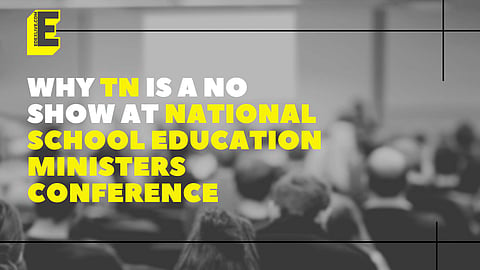

On Wednesday, May 5, Tamil Nadu boycotted the National School Education Ministers Conference, which began in Gujarat, in order to register its opposition to the National Education Policy (NEP) 2020. Neither School Education Minister Anbil Mahesh Poyyamozhi nor the department secretary took part in the event.
The two-day conference, chaired by Union Education Minister Dharmendra Pradhan, is being conducted to deliberate on strengthening the education ecosystem in the country with a focus on the implementation of the NEP.
TN wants to register its protest against the NEP through the boycott, shared the school education department officials. The DMK-led government in the state has been strongly against NEP right from the beginning, protesting that it be withdrawn. As a counter to the NEP, the ministry has established an expert committee to workout its own State Education Policy (SEP).
War of words
Since Prime Minister Narendra Modi's visit to Chennai last week, the controversy over NEP has become more heated in Tamil Nadu. The PM said that NEP would be beneficial to the students of Tamil Nadu while speaking at a gathering in Chennai. This was followed by a war of words between Governor RN Ravi and Higher Education Minister K Ponmudy over the issue.
The Governor addressed the need to implement NEP in the state and urged people to read it properly before opposing it. While Ponmudy retorted that people were opposing NEP with a full understanding of all its features. This happened at different convocation ceremonies of state universities.
As per the education department officials, the state had put forth many suggestions when the draft NEP was released but they were not taken into consideration in the policy. A senior official of the department commented, “There are many aspects that need further discussion like Hindi imposition, entrance tests. The Centre has never acted in a positive manner to settle the concerns raised by us over NEP.” Recently, Ponmudy remarked that the imposition of NEP will only increase dropouts in schools and colleges.
What they had to say about the boycott
Although, a few activists opine that the state would have had a better chance to put forth its point strongly by attending the conference instead. “In conferences like this when policies are being discussed, votes of the states are very important. The same issue happened with NEET. The Centre had argued about sudden dissent and why the State was not present in the conferences when it was being discussed. We must attend and then contradict,” said V Balachandar, an educationist.
The majority of the education rights activists and educationists welcomed the boycott and called it a strong ‘statement’ against NEP. “Boycotting does make a statement that we are against the policy. The NEP does not provide equal access to education and a state, that has been voicing for equal rights so strongly, can only deny it. But, it is high time the government comes out with a categorical procedure to implement an alternative education policy,” said education rights activist, Prince Gajendra Babu.
